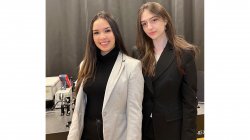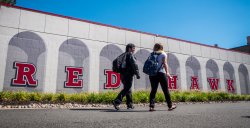Physics students win best poster competition at LIGO-Virgo-KAGRA Collaboration meeting

Two physics majors, Mariam Mchedlidze and Ariella Hernandez, are winners of this year’s poster prize competition at the LIGO-Virgo-KAGRA Collaboration meeting. Both will be awarded a share of the $600 prize for their poster entitled “Magneto-optical materials for Future Gravitational Wave Detectors” in the Experiment/Instrumentation category, co-authored with their research mentor Professor Rodica Martin.
The LIGO-Virgo-KAGRA (LVK) Collaboration is a group of over 1400 scientists that collectively operate several kilometer-scale gravitational wave detectors. The LVK Collaboration also analyzes the data from these instruments, which search the cosmos for ripples in gravity produced by colliding black holes, neutron stars, and other cosmic phenomena predicted by Einstein’s theory of relativity. You can learn more about the work of the LVK collaboration at www.ligo.org.
The LVK Collaboration Meetings are held twice each year and function as one of the main venues for the entire Collaboration to gather and discuss their joint work. The presentation of work by undergraduate and graduate students is an important part of the meeting, helping to promote their development as future scientists. The meeting was held virtually due to the ongoing COVID-19 pandemic.
Mchedlidze’s and Hernandez’s work concerns the optical properties of materials when placed in a magnetic field. These materials can change the oscillation direction of a light wave (its polarization), an effect that is used in the operation of gravitational-wave detectors. Future upgrades to laser interferometer devices like LIGO and its partners will potentially operate at different frequencies of laser light. Mchedlidze, Hernandez, and Prof. Martin are testing the properties of materials to understand which are most suitable for use in these future detectors.
